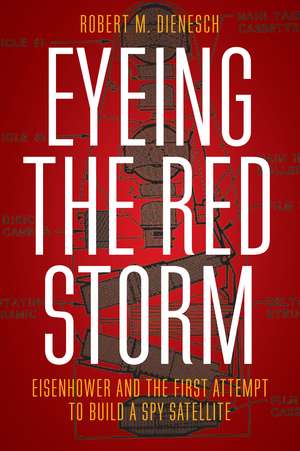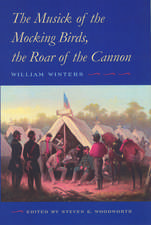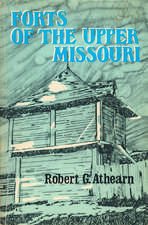Eyeing the Red Storm: Eisenhower and the First Attempt to Build a Spy Satellite
Autor Robert M. Dieneschen Limba Engleză Hardback – apr 2016
Eyeing the Red Storm examines the birth of space-based reconnaissance not from the perspective of CORONA (the first photo reconnaissance satellite to fly) but rather from that of the WS-117L. Robert M. Dienesch’s revised assessment places WS-117L within the larger context of Dwight D. Eisenhower’s presidency, focusing on the dynamic between military and civilian leadership. Dienesch demonstrates how WS-117L promised Eisenhower not merely military intelligence but also the capacity to manage national security against the Soviet threat. As a fiscal conservative, Eisenhower believed a strong economy was the key to surviving the Cold War and saw satellite reconnaissance as a means to understand the Soviet military challenge more clearly and thus keep American defense spending under control.
Although WS-117L never flew, it provided the foundation for all subsequent satellites, breaking theoretical barriers and helping to overcome major technical hurdles, which ensured the success of America’s first working reconnaissance satellites and their photographic missions during the Cold War.
Preț: 230.06 lei
Nou
Puncte Express: 345
Preț estimativ în valută:
44.03€ • 45.38$ • 37.17£
44.03€ • 45.38$ • 37.17£
Carte disponibilă
Livrare economică 10-24 februarie
Livrare express 24-30 ianuarie pentru 62.48 lei
Preluare comenzi: 021 569.72.76
Specificații
ISBN-13: 9780803255722
ISBN-10: 0803255721
Pagini: 296
Ilustrații: 1 appendix
Dimensiuni: 152 x 229 x 28 mm
Greutate: 0.58 kg
Editura: Nebraska
Colecția University of Nebraska Press
Locul publicării:United States
ISBN-10: 0803255721
Pagini: 296
Ilustrații: 1 appendix
Dimensiuni: 152 x 229 x 28 mm
Greutate: 0.58 kg
Editura: Nebraska
Colecția University of Nebraska Press
Locul publicării:United States
Notă biografică
Robert M. Dienesch is an adjunct assistant professor of history at the University of Windsor, Ontario, and a research affiliate with the Gregg Centre for the Study of War and Society. His work has been published in Quest: The History of Spaceflight and Northern Mariner.
Cuprins
Acknowledgments
Introduction: Filling in the Gap
List of Abbreviations
Part 1. Eisenhower's Delicate Balance
1. Truman and Eisenhower on the Cold War (1945-55)
2. Eisenhower and Defense: Three Challenges, Three Responses (1953-56)
3. Eisenhower and Satellite Reconnaissance: Three Projects (1954-58)
Part 2. WS-117L
4. Origins: RAND and Satellite Reconnaissance (1945-54)
5. WS-117L: Two Stages (1954-57)
6. Satellite Photography, Film Return, and the Birth of CORONA (1957-58)
7. SENTRY/SAMOS, MIDAS, and the Dissolution of WS-117L (1958-60)
Epilogue: WS-117L in Perspective
Appendix: Historiography of Eisenhower and Space Reconnaissance
Notes
Bibliography
Index
Introduction: Filling in the Gap
List of Abbreviations
Part 1. Eisenhower's Delicate Balance
1. Truman and Eisenhower on the Cold War (1945-55)
2. Eisenhower and Defense: Three Challenges, Three Responses (1953-56)
3. Eisenhower and Satellite Reconnaissance: Three Projects (1954-58)
Part 2. WS-117L
4. Origins: RAND and Satellite Reconnaissance (1945-54)
5. WS-117L: Two Stages (1954-57)
6. Satellite Photography, Film Return, and the Birth of CORONA (1957-58)
7. SENTRY/SAMOS, MIDAS, and the Dissolution of WS-117L (1958-60)
Epilogue: WS-117L in Perspective
Appendix: Historiography of Eisenhower and Space Reconnaissance
Notes
Bibliography
Index
Recenzii
"Readers searching for a detailed analysis of early spy satellite development will approve of Dienesch's accessible work."—Publishers Weekly
"An intriguing and incisive study. . . . Eyeing the Red Storm puts readers into the middle of the Cold War."—Scott Neuffer, Foreword Reviews
"Eyeing the Red Storm is a valuable contribution to the existing literature on military space programs."—Washington Book Review
"For those who have a 'Space and the Cold War' shelf in their library, this book deserves a place on it."—Pat Norris, Aerospace
"Eyeing the Red Storm is an important contribution and a worthy resource for undergraduate or graduate settings as well as for readers interested in the history of satellite reconnaissance and Cold War strategy."—Nicholas Sambaluk, H-War
"This book definitively offers a foundation for future research and as such is a welcome addition to Cold War historiography."—Emily Redman, Pacific Historical Review
“In his well-researched and convincingly argued book, Robert Dienesch has demonstrated clearly that the American spy satellite program, rather than being a knee-jerk reaction to the launching of Sputnik by the Soviet Union in 1957, was instead the culmination of years of effort by the Truman and Eisenhower administrations.”—Galen Perras, associate professor of history at the University of Ottawa and author of Franklin Roosevelt and the Origins of the Canadian-American Security Alliance, 1933–1945: Necessary but Not Necessary Enough
“Dienesch combines an explication of high-level policy formulation with technical details about reconnaissance satellite development. He penetrates the secrecy that surrounded America’s first military satellite program, WS-117L, to assess both its contributions and disappointments.”—Rick W. Sturdevant, deputy director of history, Air Force Space Command
















